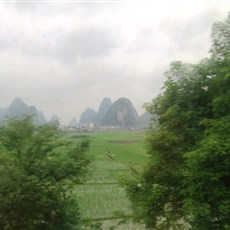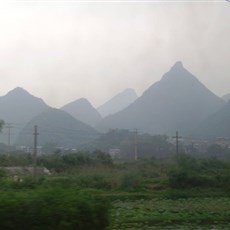3 May,
Guilin
Elan Hotel 148CNY
My 58th
birthday was spent gazing out the train window... Finally in Guilin, we checked
into a charming hotel, but our nearby dinner was mediocre.
A word on loos: Bathrooms can be a source of
anxiety in foreign lands. Chinese loos have proved a mixed bag. Hotel loos are
usually, though not always, of the western variety; public loos, plentiful and
in general, though not always, clean, of the Asian squat variety. It came as a big
surprise to us to find that, unlike in other Asian countries, China’s loos do
not include a “washing” option. This post from our Turkey blog explains what I
mean: “A word on bathrooms and toilets... For two main reasons millions of
people around the world use water rather than toilet paper after using the loo.
Firstly, they believe it to be cleaner and secondly, the sewage systems in
developing countries cannot process paper. I have come over many years to agree
with the former. On our travels we have encountered various mechanisms for
delivering the water to the required arena, my least favourite being by hand
over a squat loo. In Egypt, for example, a nozzle in the base of the loo will
release a stream of water when you turn on a small tap beside the loo. I hated
the placement of these as often the previous occupant will have pooped on the
end of the nozzle completely negating the “cleaner” raison d’être. (On
reflection, this is my least favourite!) In Southeast Asia, a small shower
nozzle on a flexible tube hangs beside the loo. On the nozzle is a lever which
releases the water flow. You can use the shower head as and where you like.
This is my favourite mechanism now also installed in our home. In Turkey,
traditionally, squat loos were the norm with nether regions being washed by
hand after use. Nowadays, western loos predominate. Inside the loo, beneath the
rim, is a nozzle. A small tap beside the loo releases a stream of water for
washing. Toilet paper is provided for drying, but this is to be deposited in a
nearby bin after use and not in the loo. This system is considerably better
than that used in Egypt, but not as flexible as the Southeast Asian option.” As
China requires one to deposit used loo paper in a basket beside the loo, the
fact that one does not wash prior to wiping, means the loo paper is soiled and
therefore somewhat odorous. Two additional oddities: (1) On one or two
occasions I had to make use of public loos without doors; in a squatting
position this leaves one feeling somewhat exposed to others entering the
facility. (2) Once I had to make use of what I can only describe as a “communal”
squat loo. Instead of individual loos astride which users squat facing the door
or back wall of a cubicle, a single deep channel ran through a series of
cubicles. Squatting astride this left one facing a side wall. This would have
been OK except that as a novice I entered the first of the series of cubicles.
This end of the channel held the only exit pipe. So waste flushed “upstream”
from me appeared beneath me as I peed, more “intimate” than I had prepared for.
[Photos taken from train.]

En route Guilin

En route Guilin